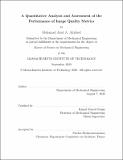A quantitative analysis and assessment of the performance of image quality metrics
Author(s)
Alrished, Mohamad Ayad A.
Download1227042747-MIT.pdf (6.752Mb)
Other Contributors
Massachusetts Institute of Technology. Department of Mechanical Engineering.
Advisor
Kamal Youcef-Toumi.
Terms of use
Metadata
Show full item recordAbstract
Image quality assessment addresses the distortion levels and the perceptual quality of a restored or corrupted image. A plethora of metrics has been developed to that end. The usual mean of success of an image quality metric is their ability to agree with the opinions of human subjects, often represented by the mean opinion score. Despite the promising performance of some image quality metrics in predicting the mean opinion score, several problems are still unaddressed. This thesis focuses on analyzing and assessing the performance of image quality metrics. To that end, this work proposes an objective assessment criterion and considers three indicators related to the metrics: (i) robustness to local distortions; (ii) consistency in their values'; and (iii) sensitivity to distortion parameters. In addition, the implementation procedures of the proposed indicators is presented. The thesis then analyzes and assesses several image quality metrics using the developed indicators for images corrupted with Gaussian noise. This work uses both widely-used public image datasets and self-designed controlled cases to measure the performance of IQMs. The results indicate that some image quality metrics are prone to poor performance depending on the number of features. In addition, the work shows that the consistency in IQMs' values depends on the distortion level. Finally, the results highlight the sensitivity of different metrics to the Gaussian noise parameter. The objective methodology in this thesis unlocks additional insights regarding the performance of IQMs. In addition to the subjective assessment, studying the properties of IQMs outlined in the framework helps in finding a metric suitable for specific applications.
Description
Thesis: S.M., Massachusetts Institute of Technology, Department of Mechanical Engineering, 2020 Cataloged from student-submitted PDF of thesis. Includes bibliographical references (pages 79-82).
Date issued
2020Department
Massachusetts Institute of Technology. Department of Mechanical EngineeringPublisher
Massachusetts Institute of Technology
Keywords
Mechanical Engineering.